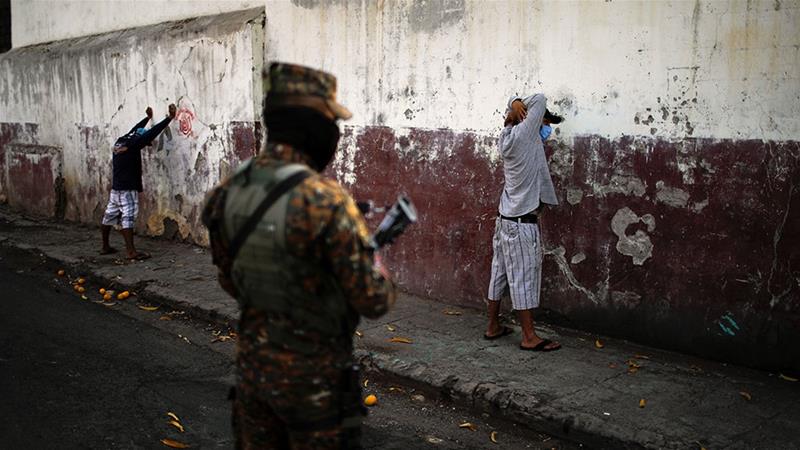Gabriel*, 50, considers his work as a vendor selling toilet paper, toothpaste, and food staples at a market near his house in El Salvador as essential to his buyers, his wife and his granddaughter. That’s why he continued to work despite a nationwide lockdown due to the coronavirus.
But police stopped him earlier this month as he was on his way home with necessary medicine for his wife, who has diabetes and high blood pressure. Now he’s in mandatory quarantine.
“The detention was arbitrary because they didn’t tell him on what grounds they were detaining him,” said his 29-year-old son. “Now my mom feels bad because my dad is not there with her. She calls me every day.”
Gabriel’s case and hundreds of others show the difficulties of enacting strict coronavirus prevention measures in Central America, where citizens are often forced to decide between staying home and feeding their families.
Most Central American governments reacted quickly to the pandemic, implementing strict quarantine and lockdown measures. The region of about 47 million inhabitants has about 6,500 confirmed cases of the virus, with the majority in Panama, according to Johns Hopkins University.
But high rates of inequality, poverty and an informal workforce have led to civil unrest in countries where more than 30 percent of the population lives on $5.50 a day or less. In some cases, desperate citizens have been met with repression and arbitrary detentions as police and military take the front line in a public health crisis.
‘The only thing we are asking for is food’
Throughout the region, citizens living in poverty have taken to the streets to protest government measures. Hungry street vendors protested in Guatemala. Panama reported recent arrests for looting.
“After some days, the need to bring home some food became stronger,” said Tiziano Breda, Central America analyst for NGO the International Crisis Group.
In Honduras, where mass mobilisations to voice citizen discontent have been common since a 2009 coup, street vendors, laid-off workers and trash collectors have blocked roads in protest of a strict curfew that has worsened conditions for the nearly 50 percent of the population that lives in poverty.
“Most people in this country live day by day. You sell some socks and you buy some eggs,” said Bertha Oliva, coordinator of the Honduran human rights group the Committee of Relatives of the Disappeared in Honduras (or COFADEH, its acronym in Spanish). “They are hungry and they have to go out.”
“The only thing we are asking for is food,” one protester told Honduran media outlet La Tribuna. “We have taken this curfew seriously and we haven’t left.”
In El Salvador, discontent reached a head in late March when Salvadorans showed up in droves at the government office in charge of administering a $300 government subsidy.
“[The president] said that he is going to help the informal sector, but he isn’t,” one woman told Salvadoran media outlet GatoEncerrado. “If he doesn’t follow through, what we are going to do is go out to sell.” That’s what Gabriel, who makes about $200 a month, did.
‘Pressure cooker’
In light of this reality, governments have reacted with contradicting responses, according to Breda.
In Honduras, the situation has created a “pressure cooker” for people who don’t have enough to feed their children, according to Oliva. “It’s not the same to have everything in your house or to have kids at home dying of hunger,” she said. “So what does [the government] do? They repress the people who should not be in the street.”
Protesters asking for food have been met by tear gas, according to a report by COFADEH. In at least one case, protesters have reported that police have threatened to shoot them with live bullets, the report says. This fits in with a pattern of excessive use of force against protesters by Honduran security forces. “This country has been inhaling tear gas since 2009,” said Oliva.
At least 28,000 citizens have been reportedly detained across the region. “This is not a game,” Guatemalan police spokesman Erwin Monroy told Reuters news agency in early April.
In El Salvador, human rights groups have contested some detentions under the principle of habeas corpus, which says a person must be brought before a judge or court to show a valid reason for arrest. The country’s constitutional court has ruled to release some people detained illegally. But President Nayib Bukele has continued to defend the police’s authority to detain people and send them to quarantine.
“The government is insisting on using confinement as a punishment to whoever violates executive orders, which are unsustainable,” said Celia Medrano, chief programme officer of San Salvador-based human rights organization Cristosal. “They have to consider that there is a situation of informal employment for subsistence for many people who are not in conditions to maintain quarantine in their own home.”
But governments are also enacting humanitarian measures to ease the burden on the most vulnerable families and alleviate tension. In El Salvador, the Bukele government has suspended utilities payments, offered a $300 subsidy to some citizens and received a $389m International Monetary Fund loan for emergency assistance. In Panama, workers who have lost their jobs can receive $40 every 15 days to cover their basic costs. Guatemala has set up an emergency fund to provide struggling families with about $130.
The Honduran government promised to distribute food to some families. But recipients of the aid told Honduran media outlet Contra Corriente that the rice, flour and beans in the package is only enough to feed a family for two days.
These programmes are only short-term solutions, said Breda of the International Crisis Group, and they risk being manipulated for political purposes. “The risk of these packages is that the help is not being equally distributed,” he said.
Breda warns that repressive measures to arbitrarily detain citizens and control their movements could become normalised in the long term, particularly if these abuses happen without resistance from citizens or civil society, he said.
“Where there’s no check, the government will implement these kinds of initiatives even when the crisis has passed,” Breda said.
“Some measures have been appropriate,” said Gabriel’s son. “But what I don’t agree with is the violation of human rights.” (https://www.aljazeera.com/indepth/features/central-america-unrest-repression-grow-coronavirus-crisis-200422202713659.html)






































